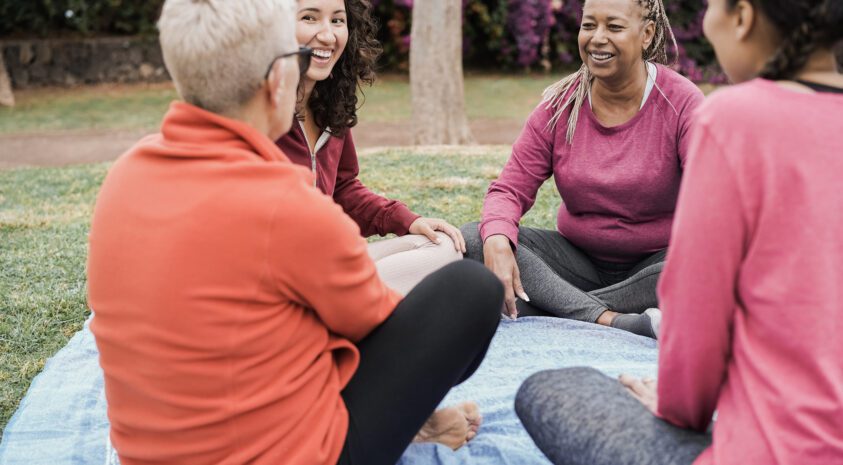Each year, the United States recognizes Older Americans Month during the month of May. The theme for 2024 is Powered by Connection. This theme looks at the profound impact that meaningful relationships and social connections have on our health and wellbeing.
If you are in the midst of your retired years, you may have noticed that you feel less connected to others than you once did. Stepping back from the workplace often leaves a hole in a retiree’s life. You could also be experiencing the deaths of friends; family members moving away; or your own health issues preventing you from being as social as you’d like.
But preserving social connections as much as possible is absolutely crucial to help both your physical and emotional health stay strong. Let’s take a look at why connectedness matters, and some creative ways to forge and maintain the ties you need.
Why You Need Connection in Retirement
Unfortunately, feelings of loneliness in retirement are all too common. According to statistics from University of Michigan National Poll on Healthy Aging, many adults ages 50-80 are lonely — and they’ve felt that way since even before the COVID-19 pandemic. In 2023:
- 34% of older adults felt isolated from others
- 37% felt a lack of companionship
- 33% only contact someone from outside their home once a week
Feelings of isolation increased among people who have poor mental or physical health; who are unemployed; who are women; or who live alone.
Connection with others is important for people of any age. Our social connections strengthen our sense of identity. They help us feel satisfied and happy.
Loneliness can increase risk of mortality by 50%. Social isolation can also increase your risk for:
- Alzheimer’s disease
- Heart disease
- Stroke
- Regulating behaviors such as drinking, smoking, or overeating
- Viral infections
- Anxiety
- Depression
- Cognitive decline
- Suicidal ideation
It’s clear why cultivating a community is so important. But for retirees, who often aren’t naturally around other people as much in their daily lives, it can take a little extra effort and creativity to make the connections you need — especially while navigating the ever-changing risk of communicable diseases such as COVID-19. If you’re tired of being alone at home, where can you begin? Follow these suggestions on ways to reach out.
7 Ways to Stay Connected
1. Tap Into Local Resources
Your county, town, or neighborhood likely has resources available to help senior adults connect. Try searching online or asking around to find community resources such as:
- Senior centers
- Libraries
- Religious institutions such as churches, temples, or synagogues
- VA centers
- Nonprofits (for example, United Way)
- Government programs
These local institutions might offer free classes, dinners, and other opportunities for socialization. If you are unable to drive, many counties also provide free or low-cost transportation for senior adults.
2. Meet Your Neighbors
Knock on a door and introduce yourself to the people who live in your neighborhood, apartment complex, or community. If you feel awkward, bring cookies and offer your phone number for them to have on hand in case of emergency. Or put in the effort to have a yard sale or host a dinner and invite anyone who’s interested. If you’re on social media, you can also look to see whether your neighborhood has a dedicated page or group.
3. Embrace Intergenerational Friendships
Are you having trouble finding friends who are in your same stage of life? Be willing to broaden your horizons. You might find that you have more in common with a working professional, a young mom, or a college student than you might think! Seeking out older or younger friends helps broaden our perspective and decrease our loneliness.
4. Enjoy A New or Old Hobby
Hobbies are a great way to stay busy, active, and connected throughout your retirement. Maybe there’s an activity you enjoyed as a young adult that you could pick back up. Or perhaps there’s something else you’ve been wanting to try for years and simply never got the chance. There’s no time like the present to jump into a hobby that sounds like fun to you!
Need some ideas to get you started? Here’s a list of example hobbies that are appropriate for people with a variety of physical abilities — and best of all, each one can be done in community with other people:
- Gardening
- Reading
- Dancing or theater
- Cooking
- Singing or playing an instrument
- Arts and crafts (sewing, scrapbooking, knitting or crocheting, photography, painting, pottery, etc.)
- Playing board games
- Hiking, camping, fishing, or cycling
- Writing
5. Use the Power of Technology
Face-to-face interaction isn’t always possible… so don’t overlook the power of technology! While it might seem intimidating or complicated to learn how to use new technology, the benefits you’ll reap are worth it. You can use technology to:
- Stay in touch with friends and family on social media
- Connect with people on forums who are going through similar life stages, such as grief or illness
- Watch videos or take courses on topics you’re interested in
- Conduct video calls with friends and family
- If you’re single, use online dating sites geared for seniors
Technology can help you keep up with old connections and make new friends, too. And using the Internet is often more accessible for people who might struggle to get out of the house due to a disability or health condition.
6. Volunteer Your Time
If you’re looking to increase your sense of community and belonging, taking the time to volunteer will pay major dividends. You might choose to volunteer for a:
- Thrift store
- Political organization
- Animal shelter
- Hospital
- Religious institution
- Food bank
- School mentorship program
- State park
There are likely a variety of volunteer opportunities available in your local community. Research available options and consider what causes you feel most passionate about. Then select an area where both overlap.
7. Be Persistent
Our final piece of advice? Don’t give up. Creating community can be hard at any stage of life. As you try to maintain relationships, be willing to be the person who reaches out and the person who follows up — calling that new friend you met last week and asking if they’d like to get dinner. You might need to put yourself out there… and it might feel awkward at first. But as you begin to build a community of strong, vibrant relationships to support you during retirement, the rewards you feel will be 100% worth it.
We’re here for you!
Bankers Life is here to help customers with their financial and insurance needs so please visit us at BankersLife.com to learn more.



